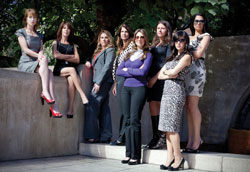Getting Connected: Solo Lawyers Build Support Networks

LA group members Elizabeth Murphy, Deborah Bass, Sue McDermott-Mercer, Karen Calhoun, Ellie Navid, Ruth Seroussi, Jeannette Yazedjian and Archana Acharya. Photo by Sal Owen.
When Dana Z. Johnson went solo in 2007, she was worried about who to lean on for advice.
She called two friends who had recently hung their own shingles and asked to meet with them. Today some 60 Chicago-area “friendly solos” with legal specialties as diverse as sports and real estate meet once a month at a local watering hole, splitting into small roundtable discussions to trade referrals, share best practices and just shoot the breeze.
“One of the main problems about going solo is you don’t feel you have a support system you can rely on,” says Johnson, whose practice is based in Glenwood, Ill. “I wanted to talk about the challenges we had and bounce ideas off one another.”
She’s gotten business group members, and some have covered court hearings for her. She shares office space with one and rents to two others. The partner of a group member even designed her logo.
Networking is a critical component for building a successful solo practice. To help boost their networks, some lawyers are putting together such informal career groups. More than just being a good place to talk shop, the groups help solos combat the feelings of isolation that can come from running a small business when economic pressures remain high.
There is also strength in numbers. Johnson’s group has arranged discounts on services such as photography, credit card processing and website hosting.
“People would hear about the group and then show up,” she says. “It eventually started to spread by word of mouth.”
ON TOPIC
Johnson has few criteria for admission other than being a practicing lawyer from a small firm. To get on a discussion list she created to encourage more group interaction, participants have to attend at least three meetings a year. “It is really important to maintain a sense of trust,” Johnson says.
Other networks have stricter controls. Elizabeth H. Murphy, a Los Angeles-based small-firm lawyer, recently put together a group of eight mid-career female solos vetted by her and a co-founder. None have overlapping specialties and all were already trading business leads. They meet quarterly to discuss specific topics ranging from choice of office technology to strategies for coping with work-life demands. In between, they confer over email.
“I’ve had ethical questions I’ve bounced off the group,” Murphy says, adding that a new member can be added only with everyone’s approval. “We don’t want to talk about babies and boyfriends; we want to talk about work and practice.”
Devora Lindeman, a small-firm lawyer in Orangeburg, N.Y., has participated in a monthly meeting of lawyers with varying specialties since early 2010. They have tackled issues from collections to recruitment, as well as when to raise their rates.
“As small businesses, we need to network,” she says. “It’s great to have those types of relationships.”
• What’s your story? Send story ideas to [email protected]
Sidebar
Tips for Starting a Local Network
• Purpose: Will your group be for trading referrals, sharing best practices or some combination?
• Membership: What are the criteria and who determines them? Do you want overlapping specialties? Will there be a size limit and minimum attendance requirements?
• Agenda: Open forum or set agenda? Will you limit each session to group members or bring in specialists to address topics such as billing, cloud computing and recruiting?
• Ground rules: Where and how often will you meet? If you choose a bar or restaurant, can you get a discount for bringing in a regular group?
• Benefits: What will you offer the group in exchange for participation? Consider creating a discussion group or private Facebook page where members can hash out ideas between meetings and share advice.



